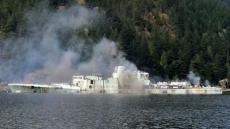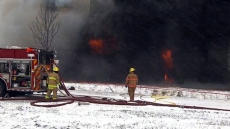OTTAWA — The least costly, most efficient and effective way to reduce Canadian greenhouse gas emissions is by putting a price on carbon — and the provinces are best situated to make the move, says a blue-chip panel of Canadian economists.
In fact, provincial leadership is "the way forward," according to the inaugural report of the same name from Canada's Ecofiscal Commission, an independent, privately funded, non-partisan think-tank.
Perhaps most surprisingly, the study's economic modelling determined that federal co-ordination, including a common carbon price across the country, is actually the least important piece of the policy puzzle and can be negotiated down the road.
"Provinces don't have to wait for anybody, and they're not," Chris Ragan, a McGill University economist and the commission's chairman, said in an interview prior to Tuesday's release of the 53-page report.
"There is momentum. Let's build on that momentum."
It's a sunny, yet hard-headed, antidote to the current climate policy gridlock in Ottawa, where the federal Conservatives continue to rail against "job-killing carbon taxes" — despite all evidence to the contrary — while refusing to regulate the oil and gas sector.
The policy prescription comes from a commission, funded by five family foundations and two corporate sponsors, comprising 10 nationally recognized economists and backed by a cross-partisan advisory board that includes the likes of Reform party founder Preston Manning, former Alberta finance minister Jim Dinning, tax specialist Jack Mintz and Suncor CEO Steve Williams.
The commission's first report lays out in cogent detail the costs of climate inaction, the market efficiencies of carbon taxes or a cap and trade system (it declines to pick a favourite) and the benefits of "recycling" the resulting revenues in the economy.
It looks at existing carbon pricing policies in Alberta, B.C. and Quebec and assesses provincial differences in economic activity, emissions profiles and energy mixes.
"To us, the big, big argument is that provincial action is in our view the practical way to do it," said Ragan, who has served as an adviser to the governor of the Bank of Canada and at Finance Canada.
"To us it's not a political argument, it's an economic practicality argument to say: if you want to design systems that work, how would you do it best?"
Any federal government of any political stripe that hoped to impose a national carbon pricing policy "would actually confront very serious challenges," that have nothing to do with partisan rhetoric, he said.
That's in part because carbon pricing generates government revenues, which in a centralized, top-down system would presumably flow to federal coffers for redistribution — conjuring memories of the hated national energy program from the 1980s.
Any national program also must confront the regional economic complexity of the country.
"Provinces could avoid those two problems in one fell swoop," said Ragan.
Under the models used in the commission report, provinces could meet their current 2020 targets for reducing greenhouse gas emissions more efficiently by pricing carbon than through any other regulatory means.
The report supposes that all revenues generated would go to income tax reductions, although in reality provinces could use those revenues as they saw fit.
The analysis found that by pricing carbon, recycling the revenues into tax cuts, and harmonizing the carbon price across provinces and territories, the country could meet its current 2020 emissions targets while collectively enjoying a 3.7 per cent bump in GDP compared to taking a regulatory approach. Individual provinces would see higher or lower GDP gains, with the biggest relative gains going to oil-and-gas-producing jurisdictions.
Some economists have suggested a quilt of separate provincial carbon pricing systems would be an "inefficient hodgepodge," said Ragan.

What surprised the commission authors was that pricing carbon, plus recycling the revenues, accounted for most of the relative GDP gains — 3.3 per cent. Just 0.4 per cent would come from establishing a single, pan-Canadian carbon price, making it the least important element of realizing efficiency gains from carbon pricing.
"The kinds of arguments we are making need to be made by economists," said Ragan.
"The mindset out there is that you can't have a better environment without paying the economic price. I think that's wrong — if you do it right."
A timeline of Canadian developments in the carbon-pricing debate since 2007
— April 24, 2007: British Columbia joins five western U.S. states in the Western Climate Initiative, a market-based climate action group.
— March 8, 2007: Alberta becomes first province to legislate greenhouse gas reductions from large industrial emitters by introducing a price on carbon through the "specified gas emitters regulation," which came into force July 1, 2007.
— April 18, 2008: Quebec and Ontario formally join the Western Climate Initiative.
— July 1, 2008: B.C. becomes first province to implement a carbon tax.
— May 30, 2008: Conservative environment minister John Baird says, "Carbon trading and the establishment of a market price on carbon are key parts of our Turning the Corner plan."
— Oct. 14, 2008: Conservative government wins federal minority mandate on platform that promised to "develop and implement a North American-wide cap-and-trade system for greenhouse gases and air pollution, with implementation to occur between 2012 and 2015."
— Oct. 14, 2008: Liberal party suffers its worst defeat to that point in the party's history on a platform that promised to raise up to $15 billion in carbon taxes, offset by cuts to income taxes.
— Nov. 19, 2008: Conservative speech from the throne promises, "We will work with the provincial governments and our partners to develop and implement a North America-wide cap-and-trade system for greenhouse gases and an effective international protocol for the post-2012 period."
— June 10, 2009: Conservative environment minister Jim Prentice releases two draft documents he says "lay the foundation for the development of a carbon market across Canada .... It does so by establishing a price for carbon in Canada — something that has never been done before in this country."
— December 2009: Conservative government says it is "working in collaboration with the provinces and territories to develop a cap-and-trade system that will ultimately be aligned with the emerging cap and trade program in the United States."
— May 2, 2011: Conservatives win majority government on platform that dropped promise of cap-and-trade system, while official Opposition NDP and third-place Liberals both included cap-and-trade systems in their platforms.
— Jan. 1, 2013: Quebec formally starts operating within the Western Climate Initiative's cap-and-trade carbon market.
— Nov. 12, 2013: Prime Minister Stephen Harper's parliamentary secretary issues a public statement: "Canada applauds the decision by Prime Minister Abbott to introduce legislation to repeal Australia's carbon tax. The Australian prime minister's decision will be noticed around the world and sends an important message."
— Dec. 17, 2014: Harper tells CBC he would like to see Alberta's carbon tech fund model, which prices carbon, implemented across North America.
— Jan. 14, 2015: Ontario government says it plans to introduce carbon pricing in 2015.
— March 31, 2015: Harper tells House of Commons, "Canadians do not think we respond to fallen oil prices by hiking taxes on the energy industry. They do not think we respond to that by imposing carbon taxes on Canadians."
— April 7, 2015: Release of "Turning the Corner: A Practical Approach to Reducing Canada's Greenhouse Gas Emissions," by Canada's Ecofiscal Commission, recommending provinces take lead on carbon pricing.





